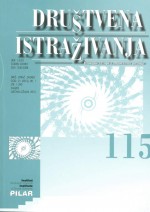Predrasude u dječjoj dobi: provjera dviju skala socijalne distance
Prejudice in Childhood: Validation of Two Social Distance Scales
Author(s): Jelena Maričić, Kristina Horvat, Željka KamenovSubject(s): Social Sciences
Published by: Institut društvenih znanosti Ivo Pilar
Keywords: children's prejudice; social distance; social rejection; persons with disabilities; obese persons; Roma
Summary/Abstract: The aim of this research was to study children's prejudice. We administered children's social distance scales to 311 fifth graders from 6 elementary schools in Zagreb. One of the scales measured willingness to engage in more or less distanced forms of contact (from living in the same town to forming close friendships), while the other measured willingness to spend leisure time through doing various activities with peers who had some specific characteristic. Target groups were blind children, children who use a wheelchair, obese children and Romani children. Factor analysis on both measures for every group produced meaningful one factor solutions. On both instruments children expressed the highest prejudice toward Romani children, while social distances toward the other three groups were similar. Boys constantly showed higher social distances than girls. There were also relatively high correlations between social distances toward the same groups on different instruments. The results generally indicate children's tendency to reject members of different groups and accentuate the necessity for interventions during preadolescence.
Journal: Društvena istraživanja - Časopis za opća društvena pitanja
- Issue Year: 21/2012
- Issue No: 115
- Page Range: 137-158
- Page Count: 22
- Language: Croatian

